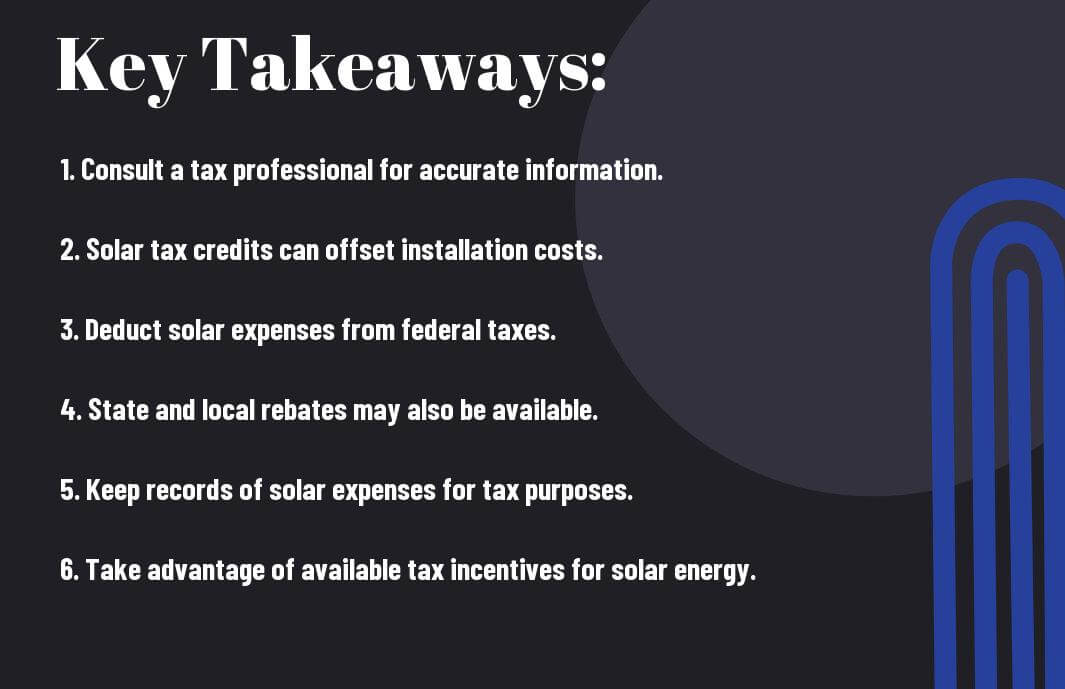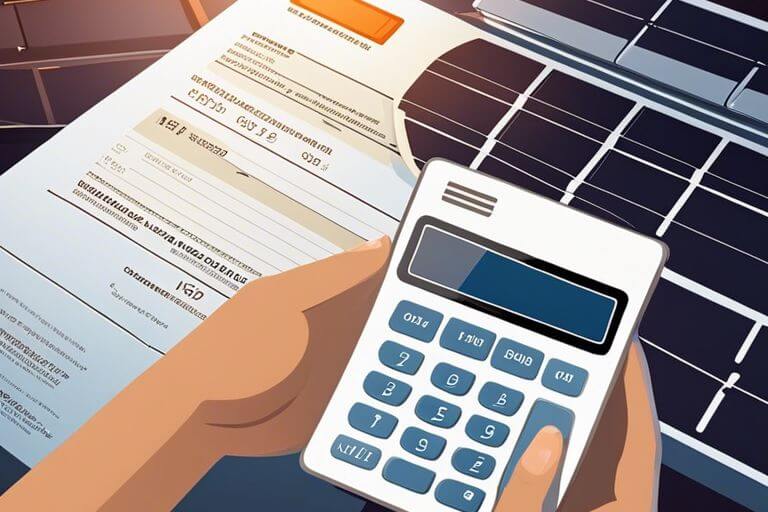Thinking about going green with solar panels? Wondering if you can catch a break on your taxes? We’ve got good news for you! Pertaining to your tax return, the option to write off solar on taxes can be a bright spot. Here’s a breakdown of how you can potentially save some green while investing in green energy.

Key Takeaways:
- Federal Tax Credit: Homeowners can receive a federal tax credit for installing solar panels, worth up to 26% of the total system cost.
- State Tax Credits: Some states also offer tax credits or other incentives for solar energy systems, providing additional savings to homeowners.
- Consult a Tax Professional: Tax laws and incentives for solar can be complex, so it’s recommended to consult with a tax professional to ensure proper tax deductions are claimed.

What Are Solar Tax Credits?
To answer your question ‘Can I write off solar on taxes?’, it’s crucial to understand the concept of solar tax credits. These credits can help reduce the cost of installing solar energy systems for your home or business.
Federal Solar Investment Tax Credit (ITC)
The Federal Solar Investment Tax Credit (ITC) is one of the most significant incentives available for those looking to invest in solar energy. The ITC allows you to deduct a percentage of the cost of installing a solar energy system from your federal taxes. Currently, the ITC offers a 26% tax credit for systems installed before the end of 2022.
State and Local Incentives
Solar energy incentives do not stop at the federal level. Many states and local governments offer additional incentives to encourage the adoption of solar power. These incentives can include rebates, tax credits, performance-based incentives, and sales tax exemptions.
Solar incentives vary widely by location, so it’s crucial to research what programs are available in your area. Taking advantage of these state and local incentives can further reduce the upfront cost of going solar and shorten the payback period for your investment.
Eligibility Requirements
Residential Solar Systems
Requirements for claiming a tax deduction for your residential solar system include owning the property where the system is installed and using the system to generate electricity for your home. You must also have tax liability to offset with the solar investment tax credit (ITC).
Commercial Solar Systems
To be eligible for tax benefits on commercial solar systems, your business must own the system and use it to generate electricity for the property. Additionally, you must have tax liability to take advantage of the tax incentives provided for commercial solar installations.
A commercial solar system can provide numerous financial benefits beyond tax incentives. By investing in solar energy, your business can reduce operational costs, increase property value, and demonstrate a commitment to sustainability, which can attract customers and investors.
Non-Profit Organizations
If you are a non-profit organization, you may also qualify for tax incentives when installing a solar system. The requirements typically include owning the property where the system is installed and using the solar energy for the organization’s operations. As a non-profit, you may benefit from tax deductions and cost savings associated with solar energy.
Non-profit organizations can leverage solar power to reduce utility expenses, allocate more funds to their mission, and enhance their reputation by adopting environmentally friendly practices. Installing solar panels can also serve as a tangible demonstration of the organization’s commitment to sustainability.
How to Claim the Solar Tax Credit
Filing Requirements
Keep in mind that in order to claim the Solar Tax Credit, you must file IRS Form 5695 along with your federal tax return. This form will allow you to calculate the amount of credit you are eligible for based on your expenses related to solar energy systems.
Necessary Documents
Filing your taxes for the Solar Tax Credit requires some necessary documents. You will need to have records of the expenses incurred for purchasing and installing the solar energy system. This includes receipts, invoices, and any other relevant proof of payment.
Solar energy systems are a significant investment, but the good news is that the IRS offers a tax credit as an incentive for environmentally friendly practices. By keeping thorough documentation of your expenses, you can ensure a smooth filing process for claiming the Solar Tax Credit.
Deadline for Filing
Another important aspect to consider when claiming the Solar Tax Credit is the deadline for filing. The credit is available for systems installed before December 31, 2022. You must ensure that your system is up and running before this date to be eligible for the credit.
Necessary
For instance, if you purchase a solar energy system in 2022 and have it installed by the end of the year, you can claim the Solar Tax Credit on your taxes for that year. It’s crucial to stay informed about the deadlines and requirements to make the most of this tax credit.
What Expenses Qualify for the Tax Credit?
Equipment Costs
For equipment costs to qualify for the solar tax credit, they must be directly related to the installation of your solar energy system. This includes solar panels, inverters, mounting equipment, and any additional components needed to generate renewable energy for your home.
Installation Fees
What you may not realize is that installation fees are also considered qualifying expenses for the solar tax credit. This means that any fees paid to professional installers to set up your solar energy system can be included when claiming the tax credit.
It’s important to keep detailed records of all installation fees paid, including labor costs and any additional charges for customizing the installation to your specific needs. Having this documentation will help you accurately calculate the total expenses eligible for the tax credit.
Permits and Inspections
The solar tax credit also covers permits and inspection fees associated with the installation of your solar energy system. This includes any costs incurred for obtaining the necessary permits from your local government and having the system inspected to ensure it meets safety and quality standards.
For instance, if you had to pay a fee to your city’s building department for a solar permit or hire a third-party inspector to evaluate the system’s compliance with regulations, these expenses can be included in your tax credit claim. Be sure to keep all receipts and documentation related to permits and inspections for your records.
How Much Can I Write Off?
Calculating the Tax Credit
Much like any tax credit, the amount you can write off for installing solar panels on your home depends on a few factors. The Federal Investment Tax Credit (ITC) currently allows you to claim a credit for a percentage of the qualified expenses related to your solar energy system. This percentage is typically around 26% but can vary based on the year you installed the system.
Limitations and Phase-Outs
Any tax credit for solar panels comes with limitations and phase-outs. These limitations may restrict how much of the total cost you can claim as a credit. Phase-outs mean that the percentage of the credit decreases as time goes on, eventually phasing out completely. Therefore, it’s necessary to be aware of these limitations when considering how much you can write off on your taxes for solar.
Plus, some states offer their own incentives and credits for installing solar panels, so be sure to look into what additional savings you may be eligible for based on where you live.

Common Mistakes to Avoid
Incorrect Installation Dates
Dates are crucial when it comes to claiming your solar tax credit. One common mistake to avoid is providing incorrect installation dates on your tax forms. If you are unsure about the exact date, it’s necessary to double-check with your solar installer to ensure accuracy. The installation date determines the tax year in which you can claim your credit, so getting this right is crucial for maximizing your potential tax savings.
Incomplete Documentation
As far as claiming a solar tax credit, having complete documentation is key. This includes invoices, receipts, and any other relevant paperwork that proves the cost of your solar installation. Incorrect or incomplete documentation can cause delays in processing your tax credit or even result in a denial of your claim.
This is why it’s necessary to keep detailed records of all expenses related to your solar installation. Make sure to organize and store all your documentation in a safe place so that you can easily access it when filing your taxes.
Missing Deadlines
One of the most common mistakes to avoid when claiming a solar tax credit is missing the filing deadline. The IRS has strict deadlines for claiming your tax credit, and failing to submit your documentation on time can result in a loss of potential savings. Make sure to mark your calendar with the relevant deadlines and plan ahead to gather all necessary paperwork in advance.
Incomplete
Summing up
Considering all points discussed in the article “Can I write off solar on taxes,” it is evident that there are significant financial benefits to installing solar panels on your property. By taking advantage of the Federal Investment Tax Credit (ITC), you can potentially save thousands of dollars on your taxes while also contributing to a more sustainable future. Make sure to refer to the Homeowner’s Guide to the Federal Tax Credit for Solar PV for detailed information and eligibility criteria.
Q: Can I write off solar on taxes?
A: Yes, you may be eligible to receive a federal tax credit for installing solar panels on your property. The federal government offers the Residential Renewable Energy Tax Credit, which can cover up to 26% of the cost of your solar system installation. Make sure to consult with a tax professional to ensure eligibility and for guidance on how to claim the credit.
Q: Are there any other tax incentives for installing solar panels?
A: In addition to the federal tax credit, some states and local governments offer their own incentives for installing solar panels, such as rebates, grants, or additional tax credits. These incentives can vary by location, so it’s important to research what programs are available in your area.
Q: Can I deduct the cost of solar panels as a business expense?
A: If you are a business owner, you may be able to deduct the cost of installing solar panels as a business expense. The IRS allows businesses to take advantage of the Investment Tax Credit (ITC) for solar energy systems, which can cover up to 26% of the cost. Consult with your tax advisor to determine how to properly claim this deduction for your business.
